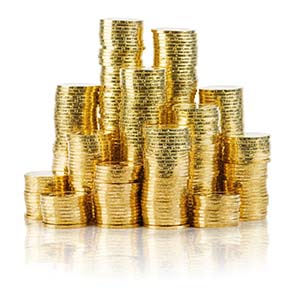 With the global economy experiencing troubling times recently, and gold prices being on the low end and steadily rising, now may be as good a time as ever to hedge your capital with this precious metal. But beware, you may be subject to a gold coin sales tax.
With the global economy experiencing troubling times recently, and gold prices being on the low end and steadily rising, now may be as good a time as ever to hedge your capital with this precious metal. But beware, you may be subject to a gold coin sales tax.
Whether or not you'll have to pay sales tax on your gold coin sales and purchases will depend on which state you live in, or where you're actually buying and selling. Certain states require that sales of gold coins be taxed, while others don't. Some states might even charge sales tax on gold coins up to a certain point, after which there may be exemptions.
You should also keep in mind that tax laws for the purchase and sale of gold coins always change. Tax laws are very complicated and intricate, which is why conducting your own due diligence is always necessary in order to avoid getting caught by the IRS for tax fraud.
But while the information provided on this page may be accurate from the day of publishing, it may be out-of-date in the near future. That's why frequently looking into what the current tax laws are in your particular state prior to buying and selling gold coins is always necessary.
Gold Coin Sales Tax Updates for 2016
For instance, in Tennessee, a bill that could get rid of sales tax on gold coins is currently making its way through the Tennessee legislature. Two bills, SB1610 and HR1627, were introduced this year and look to eliminate gold coin sales tax for coins that are used solely as a form of exchange.
In Indiana, a new law that will take effect on July 1 will repeal sales taxes for gold coins and gold bullion.
Ohio lawmakers are also getting ready to vote on bringing back a sales tax exemption for gold investment coins and bullion that was abolished 10 years ago following the Coingate scandal.
[mmpazkzone name="in-story" network="9794" site="307044" id="137008" type="4"]
These are only some of the recent changes in gold coin sales tax, with more inevitably to come. That's why it's crucial to find out the exact current status of the sales tax laws in the state in which the gold coins are being purchased or sold in order to remain in compliance with the IRS.
Gold Coin Purchases
If you reside in a state with sales tax, you will obviously be subject to paying it when buying gold coins. However, if you order your coins online from an out-of-state firm, the company might not necessarily charge you sales tax (though you'll likely need to pay 'use tax' to your state).
When purchasing gold coins, it's imperative to keep track of what was purchased throughout the year, and when, in order to accurately report the capital gains or loss.
Gold Coin Sales
When selling gold coins, you'll be subject to paying federal tax if the amount you sell for is more than what you originally paid. Since gold coins are considered collectibles, any profits made upon their sale are treated as income. However, if they are long-term gains (where the coins were held for over one year prior to selling), then the tax rate would be capped at 28%.
Understanding what your specific obligations are as far as being subject to sales tax on the purchase and sale of gold coins is important. Since the laws surrounding what certain states require in regards to the payment of sales tax on gold coin purchases and sales frequently change, it would be in your best interest to find out exactly what the current rules are in the state where your transaction will take place in.
Check out our report: The Essential Guide to Buying Gold & Silver to find out all there is to know about investing in precious metals.


